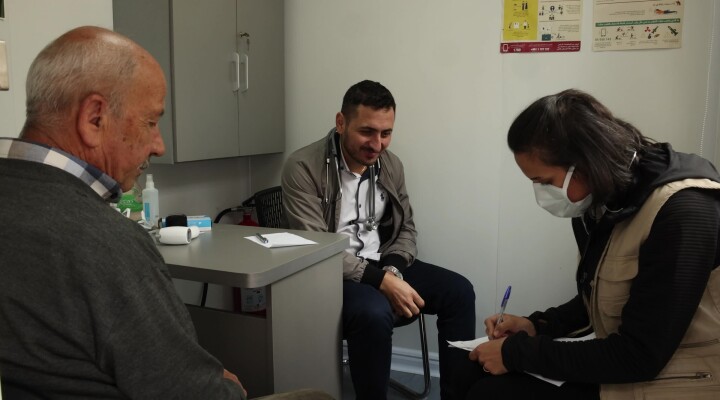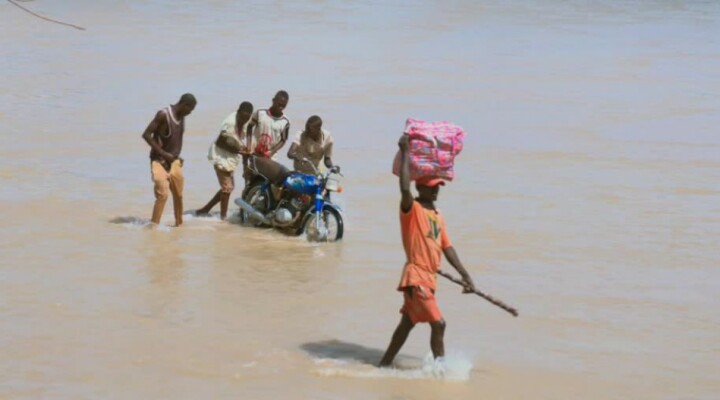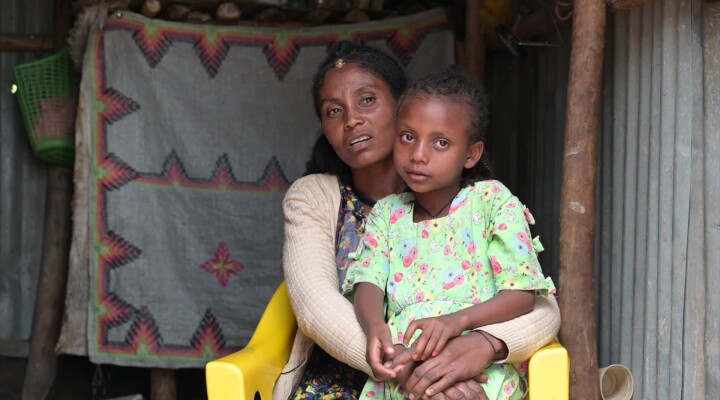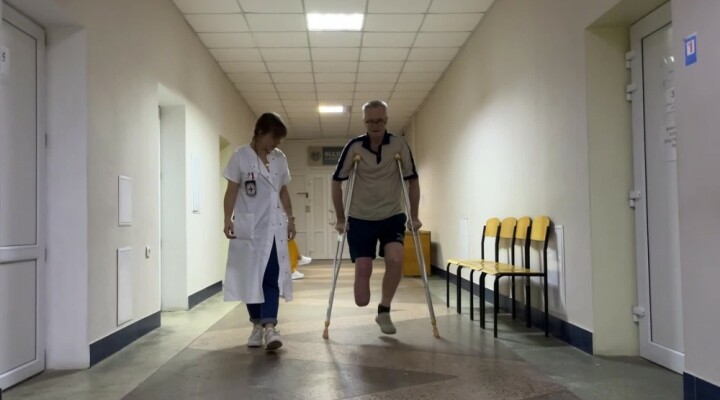Sexual violence is an invisible tragedy that happens in all the conflicts around the world according to Pascale Meige, Deputy Director of Operations at the International Committee of the Red Cross.
With 11 years experience of working in various conflict zones, Meige explains: "Victims do not seek care because they don't want to be exposed. For humanitarian workers, it is also an invisible phenomenon because the victims will not come forward and talk to you like other victims would."
Meige cites examples of rape in the Central African Republic: "We had a number of victims who went to a hospital where ICRC staff was working and we referred them to a health centre to be tested for sexually transmitted diseases. These women actually didn't go because they were not pregnant, they didn't have small children, and therefore by going there, they would have been seen as victims of sexual violence."
Meige is convinced that humanitarians must stop waiting for victims to call for help and should provide confidential health and psycho-social support services that the victims can easily access and without risk of stigma.
"We can actually reverse this invisibility by assuming by default there is sexual violence in armed conflict," states Meige, "and design responses that victims can easily reach even if we don't know how many cases and what are the patterns and trends."
In the Democratic Republic of Congo (DRC), a woman is willing to share her story without facing the camera. She was attacked during an upsurge of violence in 2012: “There was nothing I could do. They ripped off a hidden belt from around my waist. It had 100 dollars inside. Then they grabbed me, held a gun to my throat and threatened to kill me. That’s how it is when men are determined to do what they want."
She describes the shame she felt as a result of the trauma: “The day after I was raped, I felt so ashamed. They’d left me naked on the road."
In many places, victims of sexual violence are stigmatized and face massive problems within their community or own family. In many countries around the world, Red Cross volunteers go from community to community raising awareness of the issue of sexual violence and trying to prevent stigmatization. Zaina Hemedy, a DRC Red Cross volunteer says: "We volunteers are working with the community, so that one day, everyone will understand what rape is and the women can be restored to their rightful place."
A nurse at one of the main hospitals in DRC dealing with sexual violence, Nakasi Wivine, hears horrific stories of abuse every day: "War and violence are taking their toll on every one of us. We’re traumatized. As soon as the women get here, we listen to their stories. We see that no-one is able to live a normal life.”
The International Committee of the Red Cross supports 8 health centres and 40 counselling centres in DRC where victims of sexual violence can seek help.. ICRC delegates around the world meet military and armed groups reminding them of their obligations under international humanitarian law. Meige states: "We should never start from the point of view that sexual violence is inevitable in armed conflicts and other violent situations. Rules are there in war and those rules have been accepted by all states. Parties to conflicts are bound by these rules and sexual violence is totally prohibited in armed conflict as well as in human rights law."
Shotlist
Location: Various
Length: 8mins11
Format: HD and SD
Producers: Jan Powell, Didier Revol and Nicola Fell
Camera: Various
Sound: English
ICRC ref: AV163N IWD Meige
Filming Date: Various
DRC, December 2012
00:00 Various shots of a woman walking along a road and through a field (3).
00:21 Woman working in a field.
00:29Various of women in the streets
01:06 SOUNTBITE Juliette (not real name), rape victim (in Swahili):
“There was nothing I could do… First, they robbed our children. They ripped off a hidden belt from around my waist. It had 100 dollars inside.
01:35 “Then they grabbed me, held a gun to my throat and threatened to kill me …That’s how it is when men are determined to do what they want.
01:56 “The day after I was raped, I felt so ashamed. They’d left me naked on the road. It’s no wonder I felt ashamed – I was naked in public and I’d been stripped by a stranger.
02:24 Various shots of Red Cross volunteers
02:38 Noela Shabulingoza, Red Cross volunteer, talking to group of people (raising awareness of the issue of sexual violence (in Swahili):
"If he has HIV, you could get infected.
02:53 "Don’t think that it’s only women who are raped. It can also happen to men.
“Yes, men can be raped too." Shabulingoza talking to a crowd of people.
03:02 SOUNDBITE Zaina Hemedy, Red Cross volunteer, at an awareness-raising session for displaced people (in French):
"The men are burying their heads in the sand. They say it’s a woman’s problem, because women are the ones being raped.
03:11 “That’s why we volunteers are going to keep working with the community so that one day everyone will understand what rape is and the women can be restored to their rightful place."
03:27 Entrance to hospital
03:33 Various shots of women victims of sexual violence (4). Internal courtyard of the hospital.
03:52 Nakasi Wivine, nurse at Panzi hospital, in a treatment room.
03:53 Patient being examined.
04:01 Nakasi talking with patients.
04:09 SOUNDBITE Nakasi Wivine, nurse, DRC hospital (in French):
“War and violence are taking their toll on every one of us. Today it’s the villages attacked – soon it’ll be the towns. We’re traumatized.
04:23 "As soon as the women get here, we listen to their stories. We see that we are not able to live a normal life."
04:33 Landscape shot
04:45 Woman walking in the street with a baby on her back.
04:50 Daniel Bunnskog, ICRC delegate, talking to soldiers from the national armed forces at an awareness-raising session about international humanitarian law.
04 52 Daniel talking to the soldiers (in French):
Sometimes, armed men act in a way that goes against the code of conduct. In other words, they violate international humanitarian law.
05:06 “If we find out that people are being harassed or that soldiers have attacked and raped women, (05 12) we go directly to their commanders and ask them to do something about it, because that’s unacceptable.”
05:26 ICRC delegate speaking to soldiers (in French)
"Please tell your fellow soldiers about this, so we can put an end to sexual violence. Because it affects the lives of many women."
05:38 “And not only many women, but also many families. Because will a traumatized woman want to work in the fields? Or sell things at the market?
05:50 “So you’re left with children going hungry and a devastated family – because a woman was raped."
Geneva, 21 February 2014
06:00 SOUNDBITE Pascale Meige, Deputy Director of Operations, ICRC (in English)
“Sexual violence happens everywhere, in all the conflicts in the world or in other situations of violence. It is really something that is widespread and it is something we seem happening in times of peace and therefore even more in times of conflict and other situations of violence."
06:16 "Sexual violence in armed conflict is an invisible tragedy and it has two consequences. One is that the victims will not seek care because they don't want to expose themselves and the other is that humanitarian workers or local providers of care will not know that it is happening o they will not provide the services because it doesn't come to them."
06:34 "For humanitarian workers, it is also an invisible phenomenon because the victims will not come forward and talk to you like other victims would do. Therefore you really have to provide services that the victims will trust and will access and come and feel safe to tell their stories without having consequences for them."
06:55 "I can give you an example, a very recent example, from the Central African Republic where we had a number of victims who went to a hospital where ICRC staff were working and we referred them to a health centre to be tested for sexually transmitted diseases. These women actually didn't go because they were not pregnant, they didn't have small children and therefore by going there they would have been seen as victims of sexual violence."
07:18 "So the way that we can actually reverse this invisibility is by assuming by default there is sexual violence in armed conflict and other situations of violence and therefore design responses that the victims can get access to so that we create an entry point even if we don't know how many cases and what are the patterns and trends. We know that there is sexual violence so we need to provide responses that are appropriate.
07:44 "We should never start from the point of view that sexual violence is inevitable in armed conflicts and other violent situations. Rules are there in war and those rules have been accepted by all states. Parties to conflicts are bound by these rules and sexual violence is totally prohibited in armed conflict as well as in human rights law."
END 08:11



